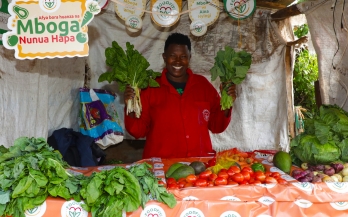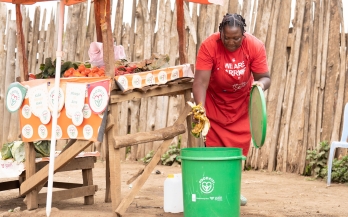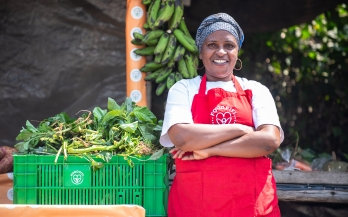Senior editors and nutrition media champions met in Nairobi on Friday for a Media Roundtable on Nutrition Education and Advocacy, jointly hosted by the Ministry of Health and the Global Alliance for Improved Nutrition (GAIN) Kenya.
Mary Wamuyu Gathemia, a 41-year-old mother of two, runs a vibrant vegetable stall in Muthumi Village, Muguga Ward, Kabete Sub-County, Kiambu County. For years, Mary operated a small general shop selling household items and a few groceries. However, her shop struggled to break even, and she was on the verge of closing it to focus on being a housewife.
GAIN Kenya is proud to announce the signing of a Memorandum of Understanding (MOU) with UNICEF Kenya to strengthen efforts to improve access to nutritious, safe, and sustainable foods for the most vulnerable. This strategic partnership underscores a shared commitment to addressing malnutrition and shaping healthier food environments for children, adolescents, and families in Kenya. The MOU was officially signed on 24th June 2025.
Every morning in Nairobi’s informal settlements, thousands of mothers head to the local market, searching for fresh vegetables to feed their families. For many, affordability is a top concern—but so is safety. Mary, a mother of three, recalls the time her youngest fell ill after a meal of sukuma wiki (kales). The vegetables had looked fine, but invisible risks like pesticide residues or poor handling were the real culprits.
Across the City, 27-year-old Joseph joins dozens of young men at a construction site, hoping to earn enough to make it through the week. With limited pay and rising costs of living, lunch often comes from a nearby kibanda—a roadside kiosk offering fast, affordable meals. It’s filling and convenient, but rarely is the question asked: Is the food safe?
Imagine a Kenya where vibrant urban markets overflow with indigenous greens, youth in peri-urban areas lead Agri-tech startups, and rural cooperatives thrive as they steward regenerative farming methods. This future was at the heart of a recent co-creation workshop in Kenya, uniting 35 food system leaders from Ministry of Agriculture, Glocolearning, Food and Agriculture Organization (FAO), SUN CSA and GAIN to chart pathways toward food systems diversification. Diversification has been widely identified as a strategy with great potential to build better resilience, nutrition, and equity across Kenya.
As the world marks International Women’s Day 2025, we celebrate the resilience, ingenuity, and contribution of women in driving economic growth and improving household nutrition. In Kenya, one of the most visible yet often overlooked players in this space is the mama mboga (the last-mile vegetable vendor) who ensures families have access to fresh and affordable produce daily.
On 15th January 2025, the bustling town of Machakos in the lower eastern part of Kenya witnessed a transformative milestone in food systems in Kenya; the commissioning of the Marikiti Market Cool Room. This state-of-the-art facility was officially handed over by the Global Alliance for Improved Nutrition (GAIN) to the County Government of Machakos in an event graced by H.E. Governor Wavinya Ndeti and GAIN Kenya Country Director, Ms. Ruth Okowa.
All around the world, countries have recognised their food systems need to change, for the health of people and planet. From a national political perspective, this transformative journey hinges on robust government policy frameworks. Government can and must lead in changing the landscape to banish malnutrition and boost healthy diets. The Kenyan government’s ongoing review of the National Food and Nutrition Security Policy exemplifies its commitment to doing just that.
“Be the voice of the children” - that was a key messages of a panel discussion held at the 2024 Sankalp Africa Summit on a sunny morning in Nairobi. It focused on how investors and those who work with them can adapt their approaches to better support children’s nutrition.
Among the five panellists — representing GAIN, the World Food Programme, UNICEF, Save the Children, and a local enterprise, Shalem Investment Limited — the motivation for doing this was clear. Children are the future, comprising nearly half of the African population at present and growing fast — expected to reach 1 billion by 2055. They thus have the potential to accelerate development not only in Africa but worldwide. But that potential is currently limited by malnutrition.
Kenya has seen good progress against some malnutrition indicators, for instance in lowering rates of under-five stunting to around 26%. But this figure remains high, while hiding large variation across different population groups.










